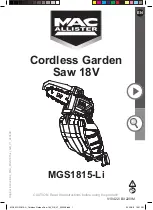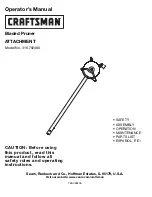
5
4.2 Noise emission
Acoustic pressure level
(according to EN ISO 11202):
Idling
LpA 102,9 dB(A)
The specified values are emission
levels and are not necessarily to be
seen as safe operating levels.
This information is intended to allow
the user to make a better estimation
of the hazards and risks involved.
Use ear protection at all times.
4.3 Content of delivery
Metal saw
Vise handle
carbide tip saw blade
Ø355mm -70T
Operating wrench
Operating manual
Spare parts list
4.4 Chop saw description
Fig 1
A…..Control handle
B…..ON / OFF Switch
C…..Movable saw guard
D…..Head return spring
E…..Vise
F…...Base
G…..Power cord
H…..Carbon brush
I……Motor
J……Carrying handle
K…..Fixed saw guard
L…...Arbor lock
P…..Adjustable depth stop
5. Transport and start up
5.1 Transport and installation
The machine is designed to operate
in closed rooms and must be placed
stable on firm and levelled surface.
5.2 Assembly
If you notice any transport damage
while unpacking, notify your supplier
immediately. Do not operate the
machine!
Dispose of the packing in an
environmentally friendly manner.
Clean all rust protected surfaces with
a mild solvent.
Unlocking the cutting head
:
The saw is supplied with the cutting
head in locked position.
Unlock the chain (B, Fig 2) and allow
the cutting head (A) to rise slowly.
Fig 2
The cutting head should be relocked
for transportation.
5.3 Mains connection
Mains connection and any extension
cords used must comply with
applicable regulations.
The mains voltage must comply with
the information on the machine
licence plate.
The mains connection must have a
16A surge-proof fuse.
Only use power cords marked
H07RN-F
Connections and repairs to the
electrical equipment may only be
carried out by qualified electricians.
5.4 Starting operation
You can start the machine by
pressing the trigger (B, Fig 3) on the
control handle with your fingers.
To stop the machine release the
trigger.
Fig 3
The attachment of a padlock (A)
avoids inappropriate start-up.
6. Machine operation
Always wear the approved working
outfit
- safety goggles
- ear protection
- dust mask.
Correct working position:
In front of the machine standing in the
direction of cutting.
Workpiece handling:
Material to be cut must be held firmly
in the vise so it can not move during
the cutting operation.
Always secure the workpiece in the
vise.
Note:
To extend the clamping range, varous
mounting positions for the vise jaw
(G, Fig 5) are provided.
Mitre cuts:
Loose the screws (D, Fig 4) and lock
the adjustable vice jaw (E) in the
desired mitre position.
Retighten the screws.
Fig 4
The vice pressure plate (F) will
automatically match the work piece
(Fig 5).



































